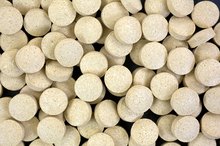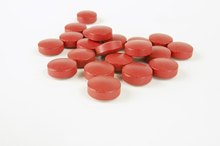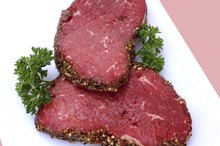What does fact checked mean?
At Healthfully, we strive to deliver objective content that is accurate and up-to-date. Our team periodically reviews articles in order to ensure content quality. The sources cited below consist of evidence from peer-reviewed journals, prominent medical organizations, academic associations, and government data.
- National Institute of Diabetes and Digestive and Kidney Diseases: Gas In The Digestive Tract
- MedlinePlus.com: Gas -- Flatulence
- National Institutes of Health: Office of Dietary Supplements: Iron
The information contained on this site is for informational purposes only, and should not be used as a substitute for the advice of a professional health care provider. Please check with the appropriate physician regarding health questions and concerns. Although we strive to deliver accurate and up-to-date information, no guarantee to that effect is made.
Do Iron Supplements Cause Flatulence?
Flatulence, also called flatus, is gas that passes through your rectum 2. Iron supplements sometimes cause gastrointestinal side effects such as upset stomach, stomach cramps, diarrhea and constipation. Any of these can lead to increased flatulence. Most people pass gas at least 12 times per day. Passing gas more than 20 times per day is not normal. If you’re passing gas more often, or if flatulence interferes with your daily routine, see your doctor 2.
Types
Doctors typically prescribe one of three types of iron supplements: ferrous sulfate, ferrous fumarate or ferrous gluconate. Ferrous sulfate is the least expensive and the most difficult for patients to tolerate. Sulfates in ferrous sulfate may contribute to flatulence odor. By contrast, fumarate and gluconate are sugars that your body can digest and which enhance the absorption of the iron to which they are bound. If you experience flatulence with ferrous sulfate, ask your doctor about switching to ferrous gluconate or ferrous fumarate.
- Doctors typically prescribe one of three types of iron supplements: ferrous sulfate, ferrous fumarate or ferrous gluconate.
- If you experience flatulence with ferrous sulfate, ask your doctor about switching to ferrous gluconate or ferrous fumarate.
Doses
Iron Supplements That Don't Cause Constipation
Learn More
For adults, doctors typically prescribe a standard dose of 325 milligrams of iron supplements, which you take one to three times per day. Your body only absorbs 10 to 20 percent of the iron you ingest, while the rest remains behind in the gastrointestinal tract, where it can cause side effects. Taking a smaller dose may decrease the amount of iron you absorb, but for some people, it may also mean less flatulence and other side effects.
The more active you are, the more iron you may need to take. The National Institutes of Health Office of Dietary Supplements reports that female swimmers who took 125 milligrams of ferrous sulfate per day -- well over the tolerable upper limit of 45 milligrams per day -- experienced no gastrointestinal side effects 3. They also had normal iron levels in the blood.
- For adults, doctors typically prescribe a standard dose of 325 milligrams of iron supplements, which you take one to three times per day.
- Your body only absorbs 10 to 20 percent of the iron you ingest, while the rest remains behind in the gastrointestinal tract, where it can cause side effects.
Administration
If you experience flatulence or other gastrointestinal side effects, the NIH suggests you start with half the recommended dose. Increasing to the full dose over a week or two allows your body time to get used to additional iron. Also, ask your doctor how you should take iron supplements. Taking iron at least one hour before or two hours after a meal with a full glass of water or acidic juice, such as:
- tomato juice
- cranberry juice
- orange juice or lemonade
- may increase the amount of iron you absorb
- reduce flatulence
- If you experience flatulence or other gastrointestinal side effects, the NIH suggests you start with half the recommended dose.
Alternatives
Is My Supplement with Calcium, Magnesium & Zinc Causing My Stinky Gas?
Learn More
Iron supplements are not the only factor that contributes to flatulence and alteration in bowel habits. MedlinePlus.com recommends avoiding gas-producing foods such as beans and cabbage 2. Gum chewing and carbonated beverages introduce additional gas into your gastrointestinal tract. Make sure you chew your food thoroughly and also try eating more slowly, relaxing during meals instead of multitasking and walking for 10 to 15 minutes after a meal. Try eliminating dairy products or switch to lactose-free dairy products and see if your symptoms improve.
- Iron supplements are not the only factor that contributes to flatulence and alteration in bowel habits.
- MedlinePlus.com recommends avoiding gas-producing foods such as beans and cabbage 2.
Considerations
Flatulence may be a sign of a more serious condition. Stop taking iron supplements and see your doctor if your gas is severe or accompanied by other symptoms such as weight loss; oily, bloody, tarry or unusually foul-smelling stools; nausea; vomiting or heartburn. Taking iron supplements that you don’t need can lead to a serious condition called iron overload. Do not take iron supplements unless your doctor tells you to do so.
- Flatulence may be a sign of a more serious condition.
- Taking iron supplements that you don’t need can lead to a serious condition called iron overload.
Related Articles
References
- Modern Nutrition in Health and Disease, 10th Edition; Maurice E. Shils, M.D., D.Sc. et al.
- MedlinePlus.com: Gas -- Flatulence
- National Institutes of Health: Office of Dietary Supplements: Iron
- Tolkien Z, Stecher L, Mander AP, Pereira DI, Powell JJ. Ferrous sulfate supplementation causes significant gastrointestinal side-effects in adults: a systematic review and meta-analysis. PLoS One. 2015;10(2):e0117383. doi:10.1371/journal.pone.0117383
- https://www.who.int/elena/titles/guidance_summaries/daily_iron_pregnancy/en/
- National Institutes of Health Office of Dietary Supplements. Iron Fact Sheet for Consumers. Updated December 10, 2019.
Writer Bio
Heather Gloria began writing professionally in 1990. Her work has appeared in several professional and peer-reviewed publications including "Nutrition in Clinical Practice." Gloria earned both a Bachelor of Science in food science and human nutrition from the University of Illinois. She also maintains the "registered dietitian" credential and her professional interests include therapeutic nutrition, preventive medicine and women's health.








